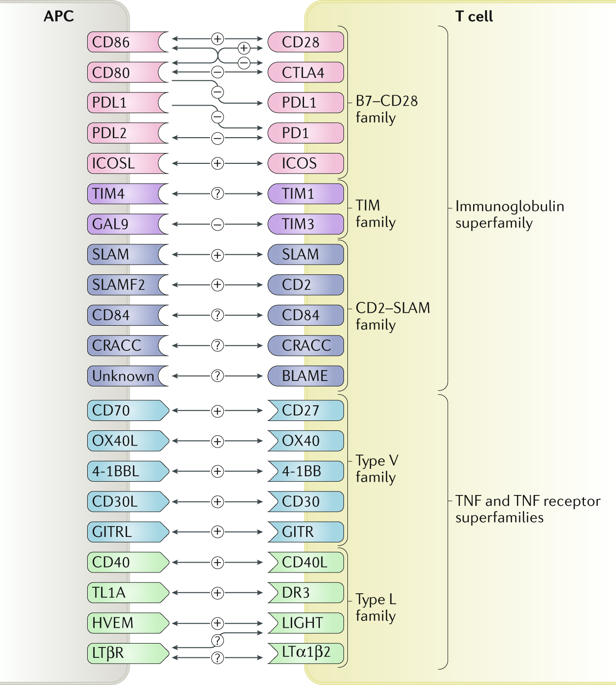当前位置:
X-MOL 学术
›
Nat. Rev. Cardiol.
›
论文详情
Our official English website, www.x-mol.net, welcomes your
feedback! (Note: you will need to create a separate account there.)
T cell co-stimulation and co-inhibition in cardiovascular disease: a double-edged sword.
Nature Reviews Cardiology ( IF 41.7 ) Pub Date : 2019-06-01 , DOI: 10.1038/s41569-019-0164-7 Karin H Simons 1, 2 , Alwin de Jong 1, 2 , J Wouter Jukema 2, 3 , Margreet R de Vries 1, 2 , Ramon Arens 4 , Paul H A Quax 1, 2
Nature Reviews Cardiology ( IF 41.7 ) Pub Date : 2019-06-01 , DOI: 10.1038/s41569-019-0164-7 Karin H Simons 1, 2 , Alwin de Jong 1, 2 , J Wouter Jukema 2, 3 , Margreet R de Vries 1, 2 , Ramon Arens 4 , Paul H A Quax 1, 2
Affiliation

|
The role of inflammation in cardiovascular disease (CVD) is now widely accepted. Immune cells, including T cells, are influenced by inflammatory signals and contribute to the onset and progression of CVD. T cell activation is modulated by T cell co-stimulation and co-inhibition pathways. Immune checkpoint inhibitors (ICIs) targeting T cell inhibition pathways have revolutionized cancer treatment and improved survival in patients with cancer. However, ICIs might induce cardiovascular toxicity via T cell re-invigoration. With the rising use of ICIs for cancer treatment, a timely overview of the role of T cell co-stimulation and inhibition molecules in CVD is desirable. In this Review, the importance of these molecules in the pathogenesis of CVD is highlighted in preclinical studies on models of CVD such as vein graft disease, myocarditis, graft arterial disease, post-ischaemic neovascularization and atherosclerosis. This Review also discusses the therapeutic potential of targeting T cell co-stimulation and inhibition pathways to treat CVD, as well as the possible cardiovascular benefits and adverse events after treatment. Finally, the Review emphasizes that patients with cancer who are treated with ICIs should be monitored for CVD given the reported association between the use of ICIs and the risk of cardiovascular toxicity.
中文翻译:

心血管疾病中的 T 细胞共刺激和共抑制:一把双刃剑。
炎症在心血管疾病 (CVD) 中的作用现在已被广泛接受。包括 T 细胞在内的免疫细胞受到炎症信号的影响,并有助于 CVD 的发生和进展。T 细胞活化受 T 细胞共刺激和共抑制途径的调节。针对 T 细胞抑制途径的免疫检查点抑制剂 (ICI) 彻底改变了癌症治疗并提高了癌症患者的生存率。然而,ICIs 可能通过重新激活 T 细胞诱导心血管毒性。随着 ICI 在癌症治疗中的应用越来越多,需要及时概述 T 细胞共刺激和抑制分子在 CVD 中的作用。在这篇综述中,这些分子在 CVD 发病机制中的重要性在 CVD 模型(如静脉移植疾病、心肌炎、移植动脉疾病、缺血后新生血管和动脉粥样硬化。本综述还讨论了靶向 T 细胞共刺激和抑制途径治疗 CVD 的治疗潜力,以及治疗后可能的心血管益处和不良事件。最后,该评论强调,鉴于报告的使用 ICI 与心血管毒性风险之间的关联,应监测接受 ICI 治疗的癌症患者的 CVD。
更新日期:2019-02-19
中文翻译:

心血管疾病中的 T 细胞共刺激和共抑制:一把双刃剑。
炎症在心血管疾病 (CVD) 中的作用现在已被广泛接受。包括 T 细胞在内的免疫细胞受到炎症信号的影响,并有助于 CVD 的发生和进展。T 细胞活化受 T 细胞共刺激和共抑制途径的调节。针对 T 细胞抑制途径的免疫检查点抑制剂 (ICI) 彻底改变了癌症治疗并提高了癌症患者的生存率。然而,ICIs 可能通过重新激活 T 细胞诱导心血管毒性。随着 ICI 在癌症治疗中的应用越来越多,需要及时概述 T 细胞共刺激和抑制分子在 CVD 中的作用。在这篇综述中,这些分子在 CVD 发病机制中的重要性在 CVD 模型(如静脉移植疾病、心肌炎、移植动脉疾病、缺血后新生血管和动脉粥样硬化。本综述还讨论了靶向 T 细胞共刺激和抑制途径治疗 CVD 的治疗潜力,以及治疗后可能的心血管益处和不良事件。最后,该评论强调,鉴于报告的使用 ICI 与心血管毒性风险之间的关联,应监测接受 ICI 治疗的癌症患者的 CVD。






























 京公网安备 11010802027423号
京公网安备 11010802027423号